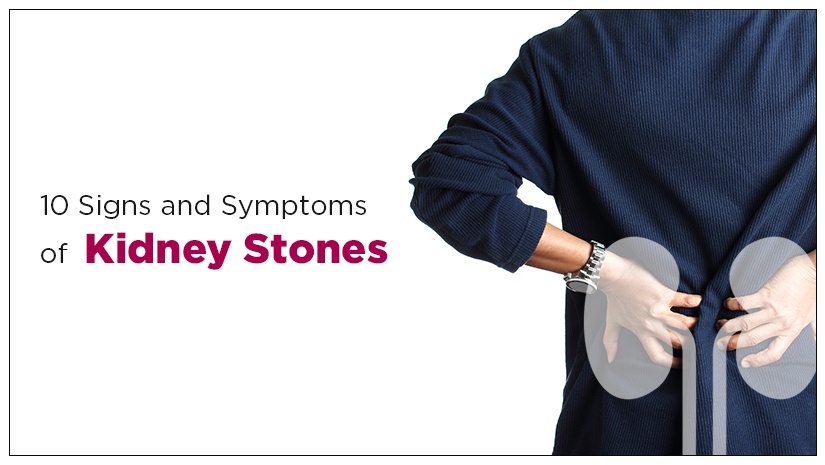10 Signs and Symptoms of Kidney Stones

10 Signs and Symptoms of Kidney Stones
 06.01.2021
06.01.2021
Kidney or renal stones disorder is also known as nephrolithiasis and it is the most common chronic kidney problem worldwide. Kidney stone formation may be caused because of lifestyle and environmental factors. This condition is more common in men than women and it can affect children too.
Types of kidney stones
Calcium oxalate stones are the most common type of kidney stones. The other types of kidney stones are made of calcium phosphate, uric acid, cystine and struvite . They may be very small like a grain or sometimes they can be the size of a pea.
The pain caused by a kidney stone is so severe that the person suffering with renal colic or pain because of kidney stone never delays the treatment. But if no steps are taken to prevent kidney stones there is more than 50 % chances for the stones to reoccur .
Small stones, that is those smaller than 5 mm in size usually pass through without creating any problems. But larger stones require urologic procedures to be removed. Any kidney stone removed should be analysed so that in future measures can be suggested to stop recurrence .
Causes
The waste products from the blood pass into the kidneys and they sometimes form crystals. The initiation and growth of kidney stones needs primarily formation of crystals and it should be in the kidney for a while. For the crystals to form the urine has to become super saturated. Over a period of time the crystals aggregate to form stones.
This may happen in circumstances such as
- when intake of fluids especially water is not sufficient
- when on some types of medications
- having a medical condition which leads to elevated levels of certain substances in the urine
Signs and symptoms of kidney stones
- Having a sharp pain in the back, side, lower abdomen or groin, the pain may come and go or sometimes pain may be experienced for a long time. Men may have pain in testicles. Renal colic is a severe type of pain.
- Pain may be accompanied by nausea and vomiting
- Haematuria that is blood in urine, blood may be red or brown. This condition is always present but it may be in microscopic amounts
- Sweating
- A constant need to urinate. If the stone is lodged at the ureterovesical junction, it may result in a sensation of wanting to pass urine frequently
- Pain while passing urine
- Unable to pass urine or passing only small quantities of urine
- Cloudy or bad-smelling urine
- Urinary infection when the stone obstructs urinary tract
- There may be fever and chills
Reasons for recurrence of kidney stones
Recurrence of kidney stone is quite common and the reasons could be one or more of these
- people who eat high protein diet which is low in dietary fiber.
- physically not active or bed ridden individuals.
- those people who have family history of kidney stones.
- people who frequently develop kidney and urinary tract infections.
- persons who have had an episode of kidney stone previously especially before the age of 25 years.
- being on certain medications.
Final word
Kidney stones are mostly composed of calcium oxalate often mixed with calcium phosphate. The severe pain makes it simple enough to diagnose. Make sure you follow the preventive measures suggested by your doctor to prevent recurring episodes.
Comments
Post a Comment